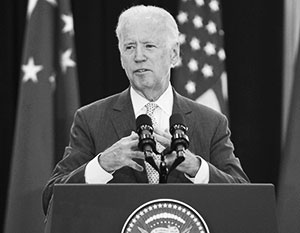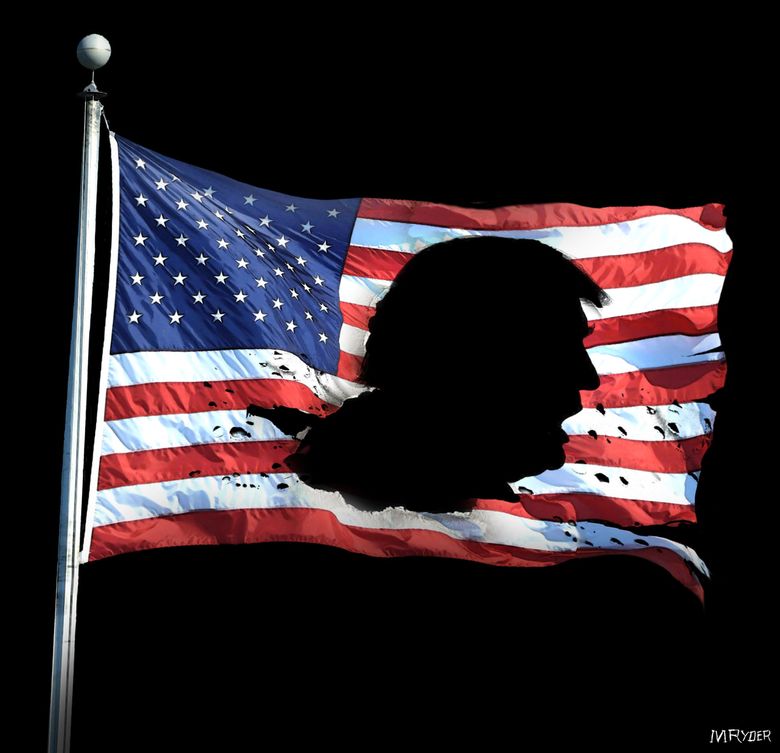
US Faces Tough Choice over China and Russia
U.S.-China relations will become the most important subject of world politics in 2021. It is predicted that after Donald Trump leaves office, Washington and Beijing will behave much more peacefully toward one another. However, is this really so — and why does Russia play an important role in these relations?
America is entering 2021 weaker than ever. This is only partially due the COVID-19 pandemic raging in the U.S. Americans, having voted in the 2020 presidential election, are in a state of near civil war. The proven strategy of “fighting during the election campaign and uniting the country again after” has now broken down, partly due to the unprecedented falsification of election results by the Democrats,* and under the weight of serious social problems in the American society, the catalyst of which was the election.
Therefore, the Joe Biden administration will have to somehow reunite the U.S. population — and nobody in the world has yet come up with a better way of rallying together than fighting a common enemy. The question is: Who is the enemy?
Real Enemy Needed
It would seem there is nothing to think about. After all, there is Russia, which the American media and its Democratic allies have invested so much time and effort demonizing. However, the problem is that the “Russian threat” is based on too many illusions, because it does not threaten the life and well-being of the average American. Russia does not scare anyone with missiles, and the thesis of “Russian interference in the American election” appears somewhat hypocritical after how the Democrats staged the election.*
Iranians are also distant and not dangerous. After all, it was not Iran who carried out the 9/11 attacks.
Therefore, China remains the only real candidate.
Both Donald Trump and the liberal American media have invested no less effort and time in their demonization of China than the Democrats have in their demonization of Russia. China, the country that similarly interferes in American elections and is now trying to “approach” officials in the Biden administration.*
China is a country that (unlike Russia) really threatens the well-being of Americans through its trade policy, and also challenges American world domination. And China does so not verbally, like Moscow (which so far has only politely warned the U.S. about the consequences of its actions), but in its behavior — using its economic power and creating an alternative to American institutions of global governance. It is the country that more than half of Americans already call the greatest threat to the U.S. (For comparison, only 24% of respondents consider Russia as such.)
Unsurprisingly, one of the few issues on which there is bipartisan consensus in the U.S. is the need to contain China. And when Trump tried to accuse Biden of being a “Chinese puppet,” the Democratic candidate's team said that Biden would oppose the Chinese much better than the Republican president, who is all talk and no action.
The antisocialist competition between the two politicians has continues since the election. Trump has introduced visa restrictions for 92 million Chinese Communist Party members and their families (now they can only get a one-time visa for a maximum of one month), and Biden says that after the inauguration, he will not cancel the additional tariffs imposed by his predecessor on the import of Chinese goods. American experts are already seriously considering that a new cold war is unfolding between the United States and China.
The question is, what will Biden do now to contain China and win this war?
In theory, the strategy is clear. Instead of Trump’s direct cavalry attacks that propose blackmailing China by introducing American tariffs, the Democrats will try to force the Chinese into a strategic siege. That is, in addition to preserving the Trump tariffs, the Democrats will apply pressure on all fronts, and not standing alone, but with the help of allies. In general, Democrats will continue the policy of Barack Obama, who tried to isolate, weaken and contain China.
Time and Ambitions
In practice, however, it will be an extremely difficult strategy to implement for at least two reasons.
First, in the four years since Obama’s departure, Beijing has seriously strengthened its position in East Asia, not only militarily, but also economically to such an extent that it is now time to talk about regional isolation of the U.S, not China.
While the Americans were engaged in domestic squabbles, China signed a Regional Comprehensive Economic Partnership agreement with 14 countries of the Asia-Pacific region, thereby creating the world’s largest free trade zone with China in the center and without the U.S.
“The creation of a new, China-centered economic bloc illustrates the difference between reality and reality TV. When Trump arrived in the White House in January 2017, one of his first official acts was to withdraw the U.S. from the Trans-Pacific Partnership, an agreement negotiated by President Barack Obama that would have created something like the RCEP, only with America at the center and China left out. Witnessing this U.S. act of self-harm, China’s leaders presumably couldn’t believe their luck, and Xi’s government has been working hard to exploit Trump’s generous gift ever since,” writes former German Foreign Minister Joschka Fischer.
Now it will be much easier for Beijing to tie up the economies of the Asia-Pacific countries and to also put pressure on them. So China is training for the U.S. on kangaroos — the Australians. Beijing has dragged Australia into a real trade war, imposing protective duties on barley, lobsters, wine, meat and other goods.
According to a number of experts, the trade war was a response to the Australian authorities’ demands for an international investigation into the emergence of COVID-19 in China, and also for not allowing Chinese investors free rein in the Australian market. Now the Chinese are demanding that the Australians make amends — and if the U.S. does not urgently intervene to save and protect its ally, then all the countries in the region will draw the correct and not very positive conclusions about Washington, after which it will be much more difficult to create some kind of anti-Chinese coalition in South and Southeast Asia.
Second, to effectively contain China, the Biden administration will have to make a very difficult choice between its aims and American security. The fact is that, as many experts (including Americans) have been saying for a while, America cannot simultaneously contain both China and Russia. A cold war on two fronts will not only require forces and resources that the modern U.S. lacks, but will also lead to further cooperation between Beijing and Moscow. And if, as a result of this cooperation, China has guaranteed supplies of Russian resources and stability in Central Asia, then it will be very difficult for Washington to manage.
Therefore, it would be logical for the U.S. to leave Russia alone and, at least, to not interfere in the process of normalizing relations between Moscow and Western countries. Indeed, the Kremlin will not join the anti-Chinese coalition of Biden and his allies, but it will not end up in the Chinese alliance either. Apologists for the stabilization of Russian-Western relations are confident that if this stabilization occurs, Russia will have no reason to participate in any projects to protect Chinese sovereignty and interests.
But is Biden’s administration ready for such pragmatism? Is future U.S. Secretary of State Antony Blinken, who called for containing Russia on all fronts to strike a blow at the internal legitimacy of the Russian government (which, according to the Blinken, rests precisely on foreign policy success), ready? Is Biden’s national security advisor Jake Sullivan, a supposed prodigy who (while working in Hillary Clinton’s camp in 2016) was one of the creators of the “Russian meddling in the American elections” hoax, ready?*
Are all these “professional fighters” against Russia ready to forget about their personal phobias in order to secure America against the Chinese threat? So far, this is the biggest and most important issue in American foreign policy.
*Editor's Note: This information is false or misleading. There were no verified cases of election fraud in the 2020 election, and references to the Democratic Party's actions and Hillary Clinton are unproven and misleading.

